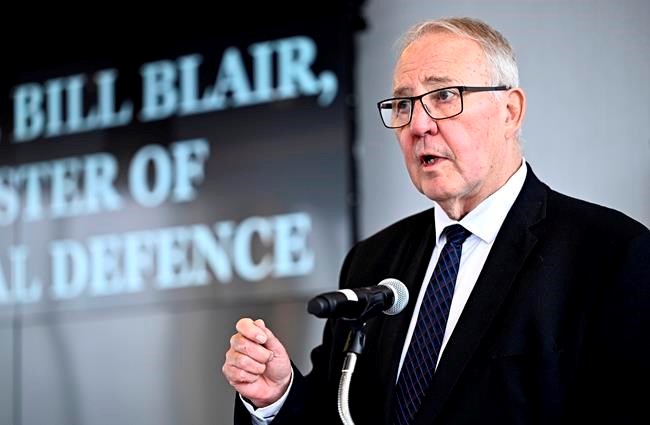OTTAWA — Defence Minister Bill Blair caught the attention of a Ukrainian general on Monday when he said allies are talking about what it will take to get to "victory for Ukraine" in the war with Russia.
Blair's comments differ from the government's long-standing promise to support Ukraine throughout the conflict, "for as long as it takes." That language has been used by G7 allies as well.
The minister was speaking at a Washington, D.C., event held by the Atlantic Council think tank, where he was asked about western support for the embattled country.
Blair responded that allies need to find ways to respond more quickly to Ukraine's urgent needs, and spoke about Canada's support for multinational groups that are working to procure ammunition and air-defence systems.
"I think there's also important discussions now taking place at NATO and in Europe, involving the United States and Canada, about what are the next steps and what additional things we can do to bring this to a peaceful resolution of victory for Ukraine," he said.
Ukraine's defence attaché in D.C., Maj.-Gen. Borys Kremenetskyi, came to the microphone a few minutes later and said it was the first time he heard talk of supporting Ukraine's victory "from this political level." He also asked Blair to clarify what a Ukrainian victory means.
Blair said he changed his own language on the issue "because 'as long as it takes' is not very hopeful or even aspirational."
"In my opinion, victory is strong, secure borders for Ukraine … victory is defeating Putin, obviously, and driving him out of Ukraine," he said.
Maria Popova, an associate professor of political science at McGill University, said there is "definitely a difference" between what Blair said and what the G7 allies have been saying.
"It's something that has been discussed a lot over the last two years, the difference between sort of helping Ukraine enough to stay in the fight, which is the implication of 'as long as it takes,' and helping Ukraine actually win," Popova said.
She said supporting Ukraine's victory requires more military aid than Western allies have provided so far under a policy of "escalation management" — trying to avoid giving Kyiv too much help because it might trigger Russia to escalate further.
"When they were preparing for the counteroffensive last summer, they didn't receive long-range missiles, they didn't receive F-16s, they had no air superiority," she said.
"You would need to do that if you wanted to support them to victory."
Asked about the shift in language, Blair's office said the government's policy remains the same. His office also noted that Prime Minister Justin Trudeau has said similar things, including that "Ukraine must win this war."
Popova said rather than "split hairs on wording," she wants to see Canada step up its own support, noting that other countries — including Germany, the U.S., the U.K. and Denmark — are spending more.
Canada has been a staunch supporter of Ukraine and has advocated for the country's inclusion in the NATO alliance when the conflict ends.
The federal government has committed $4 billion in military assistance to Ukraine through 2029. That includes donating Leopard 2 tanks and ammunition from the Canadian Armed Forces stocks, and purchasing things like armoured vehicles and drones.
As Blair noted, some of that aid has been slow to move. Canada bought a $406-million surface-to-air missile system for Ukraine in January 2023, but it's not clear when that will arrive. It's being built in the United States and the U.S. government has not provided a timeline for its delivery.
The U.S., meanwhile, has set aside an estimated US$69.8 billion to support Ukraine's military since the full-scale invasion began in 2022.
This report by The Canadian Press was first published May 14, 2024.
Sarah Ritchie, The Canadian Press



